HB test 2
5.0(1)
Card Sorting
1/42
Study Analytics
Name | Mastery | Learn | Test | Matching | Spaced |
|---|
No study sessions yet.
43 Terms
1
New cards
What is the anatomical name for the shaft of a long bone?
A) diaphysis
B) epiphysis
C) osteon
D) periosteum
E) medullary cavity
A) diaphysis
B) epiphysis
C) osteon
D) periosteum
E) medullary cavity
A) diaphysis
2
New cards
All of the following EXCEPT one are functions of the skeletal system. Select the one that is NOT a function. \n A) Support
B) Protection
C) Metabolism of fats
D) Blood production
E) Storage of minerals
B) Protection
C) Metabolism of fats
D) Blood production
E) Storage of minerals
C) Metabolism of fats
3
New cards
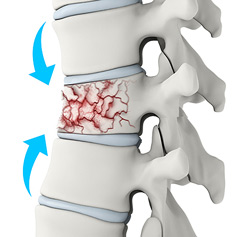
What type of fracture is characterized by the bone being crushed and is common in porous bones of older people. \n A) comminuted
B) green stick
C) compression
D) spiral
E) impacted
B) green stick
C) compression
D) spiral
E) impacted
C) compression
4
New cards
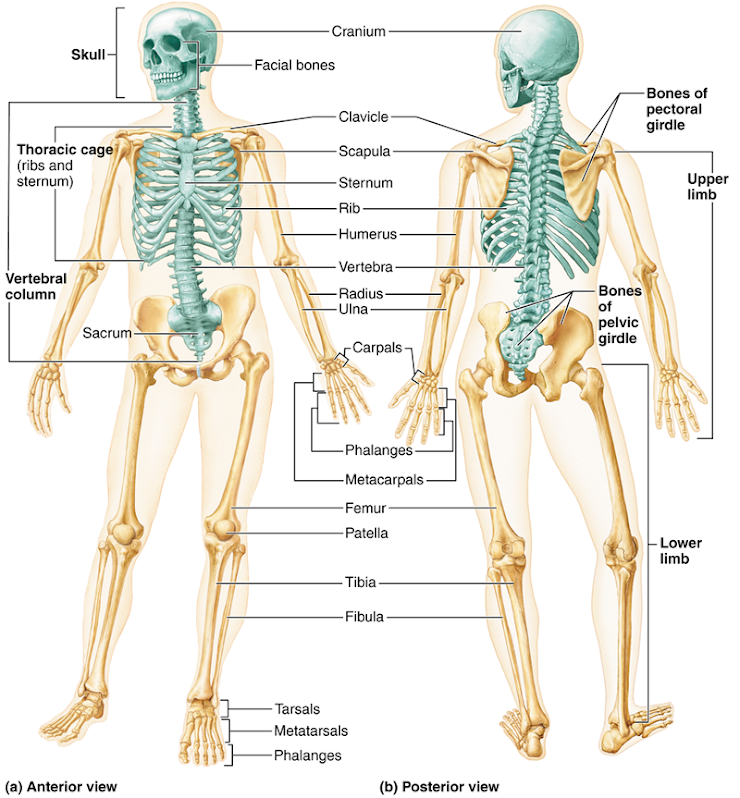
The green portion of the skeleton is known as the ______ skeleton. \n A)short
B) appendiclar
C) irregular
D) axial
E ) central
B) appendiclar
C) irregular
D) axial
E ) central
D) axial
5
New cards
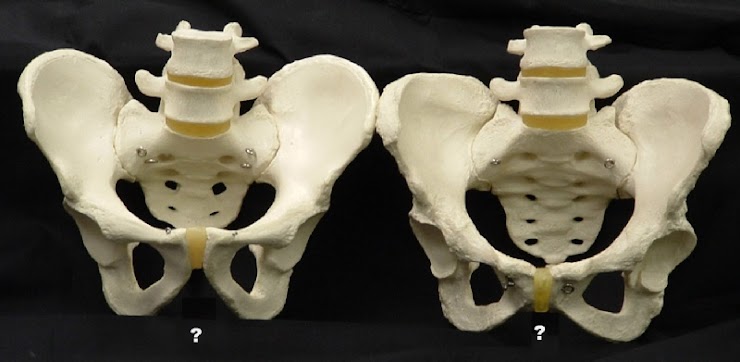
Compare the pelvis on the left with the one on the right in the image below. Is the pelvis on the right a male or female pelvis? \n A) female
B) male
B) male
A) female
6
New cards
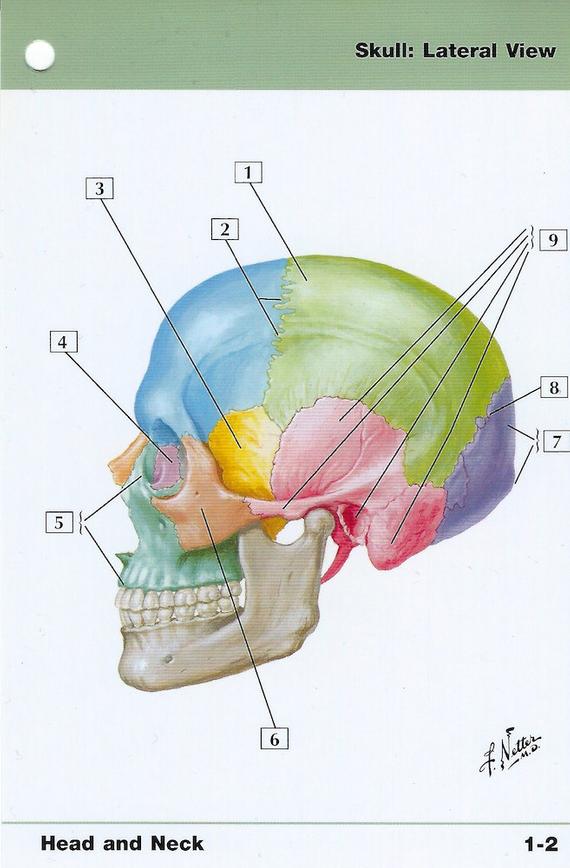
What is bone number 3 called? \n A) ethmoid
B) sphenoid
C) maxilla
D) lacrimal
B) sphenoid
C) maxilla
D) lacrimal
B) sphenoid
7
New cards
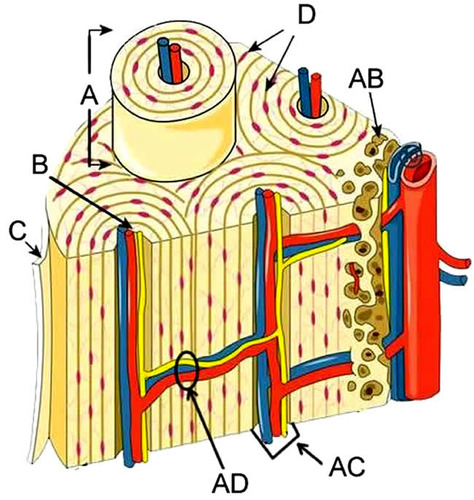
Match the name of the structure to the correct label.
A. Osteon
B. blood vessels
C. periosteum
D. lacunae
AB. Trabeculae of spongy bone
AC. Haversian canal
AD. perforating canal
B. blood vessels
C. periosteum
D. lacunae
AB. Trabeculae of spongy bone
AC. Haversian canal
AD. perforating canal
8
New cards
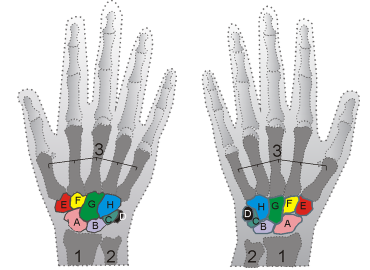
label the bones
A. scaphoid
B. lunate
C. triquetrum
D. pisiform
E. trapezium
F. trapezoid
G. capitate
H. hamate
B. lunate
C. triquetrum
D. pisiform
E. trapezium
F. trapezoid
G. capitate
H. hamate
9
New cards
The neurotransmitter that signals muscle contraction is called... \n Myosin
Actin
Calcium
Ach
Actin
Calcium
Ach
Ach
10
New cards
Individual bundle of muscle cells is known as \n epimysium
sarcomere
fascicle
fascia
sarcomere
fascicle
fascia
fascicle
11
New cards
The protein bands (one is thick, one is thin) in a muscle that are part of the process of contraction \n A) Myosin and actin
B) Troponin and tropomyosin
C) Calcium and Oxygen
D) Glycogen and hemoglobin
B) Troponin and tropomyosin
C) Calcium and Oxygen
D) Glycogen and hemoglobin
A) Myosin and actin
12
New cards
After ACh attaches to its receptors at the neuromuscular junction, what is the next step?
A) Sodium channels open.
B) Calcium binds to regulatory proteins on the thin filaments.
C) Cross bridges attach.
D) ATP is hydrolyzed.
A) Sodium channels open.
B) Calcium binds to regulatory proteins on the thin filaments.
C) Cross bridges attach.
D) ATP is hydrolyzed.
A) Sodium channels open.
13
New cards
Anaerobic respiration in muscle cells causes \n fatigue
produces lactic acid
occurs with a lack of oxygen
all of these
produces lactic acid
occurs with a lack of oxygen
all of these
all of these
14
New cards
Movable end of the muscle attachment. \n tendon
ligament
origin
insertion
ligament
origin
insertion
insertion
15
New cards
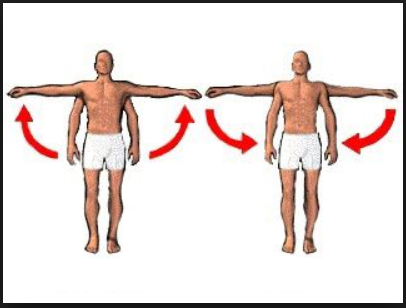
What type of movement is this? \n eversion/inversion
adduction/abduction
supination/pronation
rotate/circumduction
adduction/abduction
supination/pronation
rotate/circumduction
adduction/abduction
16
New cards
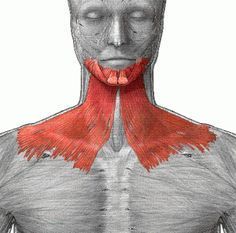
What muscle is this? \n platysma
sternocleidomastoid
pectoralis
sartorius
deltoid
sternocleidomastoid
pectoralis
sartorius
deltoid
platysma
17
New cards
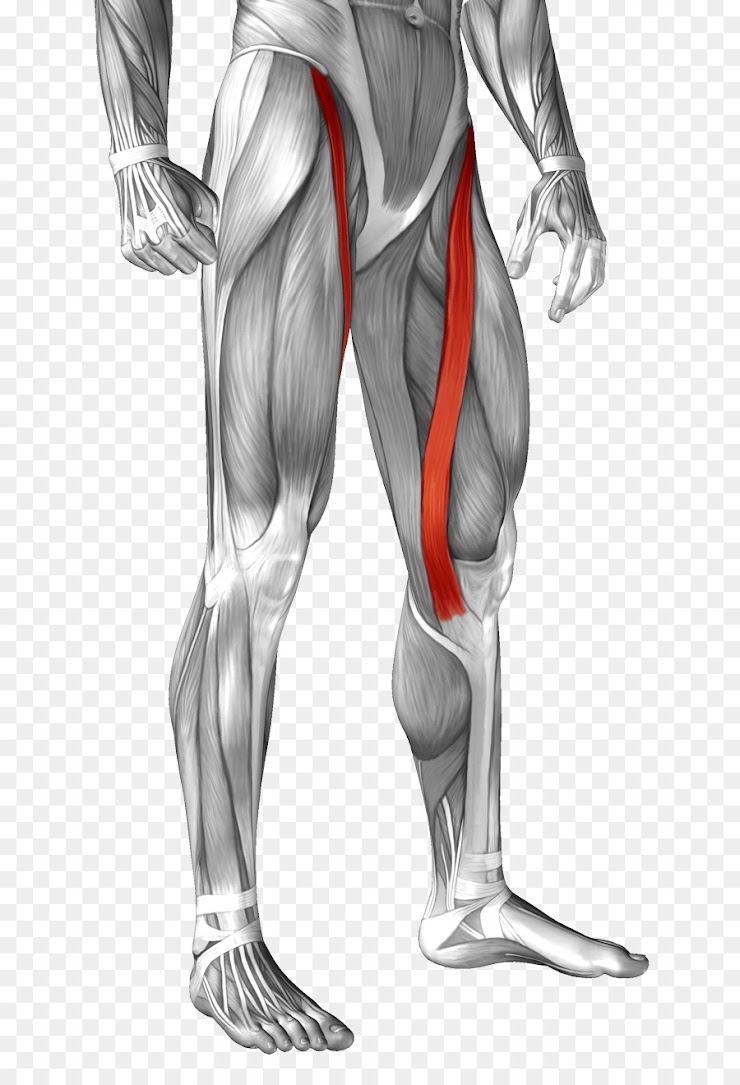
What is this muscle? \n iliopsoas
adductor muscle
hamstring muscle
gastrocnemius
sartorius
adductor muscle
hamstring muscle
gastrocnemius
sartorius
sartorius
18
New cards
Which of the following is NOT a function of the muscle system? \n stabilize joints
produce heat
protection
movement
produce heat
protection
movement
protection
19
New cards
Receives and processes visual information \n frontal
occipital
temporal
parietal
occipital
temporal
parietal
occipital
20
New cards
Neuroglia present in large numbers in areas of bacterial infection in the brain are most likely \n oligodendrocytes.
astrocytes.
ependymal cells.
microglia.
astrocytes.
ependymal cells.
microglia.
microglia.
21
New cards
Receives sensory information and relays it to the proper part of brain for further processing \n Hypothalamus
Reticular Formation
Cerebellum
Thalamus
Reticular Formation
Cerebellum
Thalamus
Thalamus
22
New cards
Damage to the cerebellum would most affect the career of \n an architect
a teacher
an athlete
a librarian
a teacher
an athlete
a librarian
an athlete
23
New cards
Autonomic NS- "fight or flight" \n Somatic
Sympathetic NS
Parasympathetic NS
Temporal Lobe
Sympathetic NS
Parasympathetic NS
Temporal Lobe
Sympathetic NS
24
New cards
The changing electrical potential associated with the passage of a an impulse along a membrane of a muscle or nerve cell
\n action potential
synapse
Na/K pump
impulse travel
\n action potential
synapse
Na/K pump
impulse travel
action potential
25
New cards
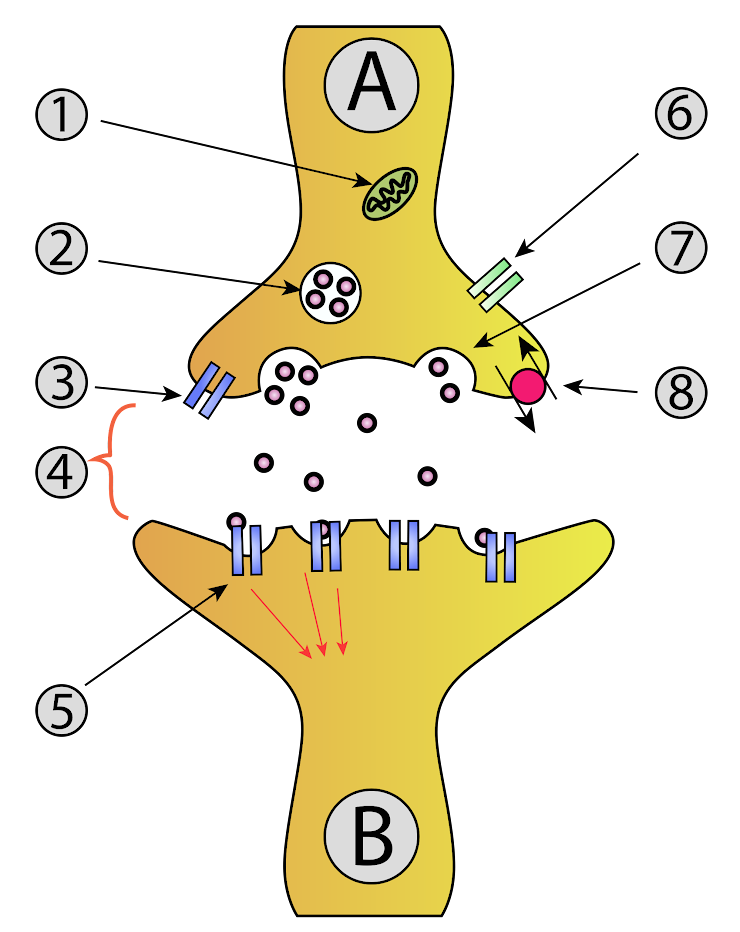
name the parts
1. mitochondria
2. vesicle
3. voltage-gated Ca+ channel
4. synapse
5. receptors
6. Ca+ channel
7. release of neurotransmitters
8. reuptake pump
26
New cards
Without the ____ the two sides of our brain couldn't communicate. \n Frontal Lobe
Corpus Callosum
Cerebral Cortex
Thalamus
Corpus Callosum
Cerebral Cortex
Thalamus
Corpus Callosum
27
New cards
Gustatory hairs are used to sense \n smell
taste
sight
touch
taste
sight
touch
taste
28
New cards
Pathway of sound vibration for middle ear. 1. Incus 2. Tympanic membrane 3. Malleus 4. oval window that connects with inner ear 5. Stapes \n
4, 5, 3, 1, 2
1, 2, 3, 4, 5
2, 4, 1, 3, 5
2, 3, 1, 5, 4
4, 5, 3, 1, 2
1, 2, 3, 4, 5
2, 4, 1, 3, 5
2, 3, 1, 5, 4
2, 3, 1, 5, 4
29
New cards
The shape of the lens is controlled by \n cilliary body
retina
pupil
the choroid
retina
pupil
the choroid
cilliary body
30
New cards
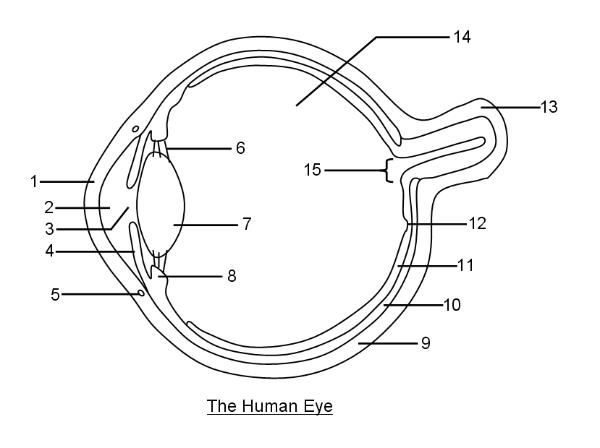
label the parts of the eye
1. cornea
2. aqueous humor
3. pupil
4. iris
5. ?
6. ciliary zonule
7. lens
8. ciliary body
9. sclera
10. choroid
11. retina
12. fovea centralis
13. optic nerve
14. vitreous humor
15. optic disc/ blind spot
31
New cards
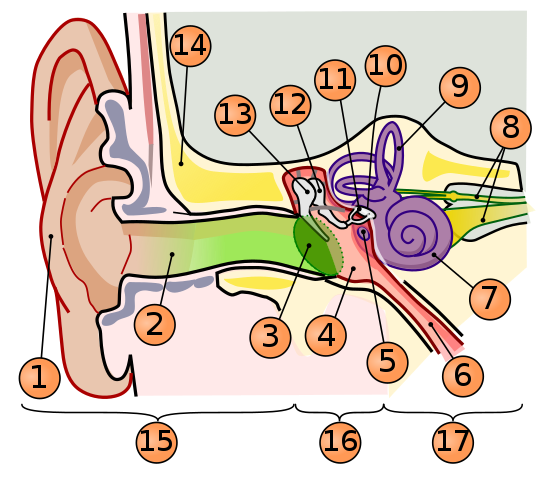
label the parts of the ear
1. auricle
2. external auditory canal
3. tympanic membrane/ ear drum
4. tympanic cavity
5. round window
6. eustachian tube
7. cochlea
8. vestibular nerve
9. semicircular canals
10. oval window
11. stapes/ stirrup
12. incus/ anvil
13. malleus/ hammer
32
New cards
Which is the correct olfactory sensory pathway? 1. Olfactory receptors activate 2. Mucus traps molecules from inhaled air 3. Multiple receptors activated by the same molecule type synapse in a glomerulus: amplify signal 4. Activated interneurons send signal to brain through olfactory tract to olfactory cortex \n
1, 2, 3, 4
4, 3, 2, 1
3, 1, 2, 4
2, 1, 3, 4
1, 2, 3, 4
4, 3, 2, 1
3, 1, 2, 4
2, 1, 3, 4
2, 1, 3, 4
33
New cards
At work, a box fell from a shelf onto Ella’s acromial region. In the emergency room, the physician felt that the head of her humerus had moved into the axilla. What had happened to Ella?
it fell on her shoulder and knocked her upper arm bone to her armpit area. this was a dislocation of her shoulder with a ball and socket joint
34
New cards
A 75-year-old woman and her 9-year-old granddaughter were in a car accident in which both sustained trauma to the chest while seated next to each other. X-ray images showed that the grandmother had several fractured ribs, but her granddaughter had none. Explain these different findings.
the older woman’s bones are weaker because of age and calcium and protein amounts becoming lessened. the child’s ribs likely had a higher amount of hyaline cartilage
35
New cards
While jogging, Mr. Ahmadi was forced to jump out of the way of a speeding car. He heard a snapping sound that was immediately followed by pain in his right lower calf. A gap was visible between his swollen calf and his heel, and he was unable to plantar flex that foot. What do you think happened?
i believe that he tore his achilles tendon which is connected to the gastrocnemius because of the location and a visible gap. this muscle and tendon allow you to flex you foot.
36
New cards
Susan fell off her bicycle and fractured her right clavicle. Treatment prescribed by the emergency room physician included using a sling to immobilize the clavicle and speed its healing. What muscles are temporarily “out of business” as a result of this injury?
Deltoid, latissimus dorsi, and pectoralis major (sternocleidomastoid).
37
New cards
When Eric returned from jogging, he was breathing heavily and sweating profusely, and he complained that his legs ached and felt weak. On the basis of what you have learned about muscle energy metabolism, respond to the following questions:
a. **Why is Eric breathing heavily?**
**b. What ATP-harvesting pathway have his working muscles been using that leads to such a breathing pattern?**
**c. What metabolic product(s) might account for his sore muscles and his feeling of muscle weakness?**
a. **Why is Eric breathing heavily?**
**b. What ATP-harvesting pathway have his working muscles been using that leads to such a breathing pattern?**
**c. What metabolic product(s) might account for his sore muscles and his feeling of muscle weakness?**
Repay oxygen debt. Aerobic respiration. Buildup of lactic acid.
i feel it should be anerobic respiration b/c of the lactic acid but this is what quizlet said
i feel it should be anerobic respiration b/c of the lactic acid but this is what quizlet said
38
New cards
As the aroma of freshly brewed coffee drifted by Joe’s nose, his mouth began to water, and his stomach started to rumble. Explain these reactions in terms of ANS activity.
If we are hungry, just the sight, smell or thought of food will cause our digestive system to signal the brain to get all the systems prepared for the entry of food. This causes the muscles that line the stomach and intestines to start moving and also to start releasing digestive fluids, which creates the rumble that is often heard.
39
New cards
Mr. Harrison is an 82-year-old bedridden gentleman who has discovered a new interest in learning about his body. While being tended by the visiting nurse, he remarks that the supporting cells in nervous tissue (such as Schwann cells and oligodendrocytes) act like the rubber coating around household wiring. What does he mean by this analogy?
Schwann cells and oligodendrocytes deposit a fatty coat called myelin around axons. Like the rubber coat around household wires, myelin acts as an electrical insulator.
40
New cards
When Taylor begins to feel drowsy while driving, she opens her window, turns up the volume of the car stereo, and sips her ice-cold water. How do these actions keep her awake?
By changing the outside environment by feeling the wind while driving or turning up the volume, or drinking the cold water, taylor is taking her body out of a "habituation" state by introducing new environmental stimuli. this allows her brain to receive new sensory input (through her skin, mouth, and ears), integrate the information, and allow for motor output to potentially increase her oxygen intake through higher heart and respiratory rate through the activation of the sympathetic division. potentially the limbic system may also be activated as well
create more stimuli and change the “normal” state to become more alert
create more stimuli and change the “normal” state to become more alert
41
New cards
Explain the role of vitamin A in vision.
Vitamin A plays a role in the manufacture of rhodopsin. Found in the eye’s retina, rhodopsin is a pigment that is highly sensitive to light and thus useful in low-light environments. Essentially, it helps you see better in the dark.
42
New cards
An engineering student has been working in construction to earn money to pay for his education. After about eight months, he notices that he is having problems hearing high-pitched tones. What is the cause-and-effect relationship here?
His condition is called something known as presbycusis, which is basically a type of sensorineural deafness. This is a type of deafness that is accelerated with exposure to loud music, and is commonly seen in teenagers and the elderly.
43
New cards
Janie is referred to the eye clinic by her teacher, who suspects a need for glasses. Examination demonstrates that Janie is myopic. Will she need concave or convex lenses? Explain.
concave; The eyeball of a person who has myopia is too long, and the images of faraway objects fall short of the retina. Therefore, concave lenses are used in glasses which correct the shortfall by spreading out the light rays before it reaches the eyeball.